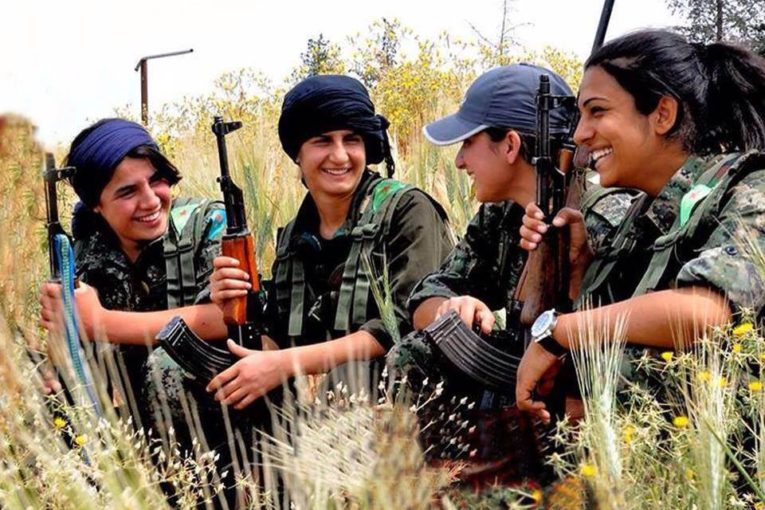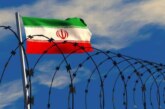
Democratic Confederalism as Alternative to Instability in the Middle East
Behnam Amini
With the demise of ISIS and its control over Syrian territory in sight, the predominantly Kurdish Syrian Democratic Forces (SDF) should be commended for their bravery and decisive role in defeating the Islamic State. Indeed, it was the Syrian Kurds who dealt the first major blow to the Islamic State in the battle of Kobani, in early 2015, and it is now the Kurds again who, as part of the SDF, are finishing off the ‘caliphate’ in Syria. However, lauding only the bravery of the Syrian Kurds in fighting ISIS – a media strategy favoured particularly by the right-wing mainstream media – runs the risk of reducing the political import of the revolution in Rojava to a strictly anti-ISIS military endeavor. Importantly, such an emphasis works to disguise the more significant promises and accomplishments of the Rojava Revolution. Rojava’s political project of Democratic Confederalism, which has possibilized the participation of women, ethnic, and religious groups in the administration of life and politics, has been integral not only to ending ethnic war and gender violence in the region but also to guaranteeing future peace and stability. Such an expanded understanding of Rojava’s program conforms to the realities on the ground, in North and East Syria, while making a strong case for the advancement of the Rojava Revolution as a transformative and transferable political platform for the entire Middle East region.
It is important to stress that the Rojava Revolution did not come into being in reaction to ISIS but rather in response to a long history of oppression and racism against the Kurds of Rojava, by the Syrian state. Indeed, all modern Middle Eastern states have institutionalized practices that entrench, in the name of a common ‘national identity’, the superiority of the states’ dominant ethnic and/or religious groups – and thus alienate minorities and communities within these states’ borders. Naturally, such dynamics of exclusion-and-alienation might push the disenfranchised toward Islamist and jihadist groups, who lure them with the promise of restored dignity and social security. For example, after the US military left Iraq in 2011, ISIS seized on the frustrations of many Sunni tribes who were dissatisfied with the sectarian government of Nuri Al-Maliki; importantly, ISIS offered them protection from Iraqi security forces. Moreover, unlike Al-Qaeda, which mainly subscribes to an anti-American ideology, the politics of ISIS is more explicitly geared toward anti-Shiite sectarianism, a message that resonates with marginalized Sunni groups in both Iraq and Syria and explains the sweeping rise of ISIS to prominence in both countries, among the conservative, Sunni populations that find policies of the Shiite governments of Iraq and Syria (Alawites) to be influenced heavily by the also Shiite Islamic Republic of Iran.
No matter, Islamists and jihadist groups cannot ultimately establish a free and just society. In the first place, although they might deliver on some of their promises and to varying degrees, these groups have rarely shown tolerance towards non-believers, and those who do not obey them. And whether reform-minded (as in the Muslim Brotherhood) or extremist, such groups have broadly followed in the footsteps of Middle Eastern states in their sectarian and chauvinist politics toward the cultural and religious minorities of the region. It is then fair to argue that, despite their ostensibly different attitudes and agendas, the typical ‘Middle Eastern state’ and its fundamentalist nemeses share an exclusivist and polarizing ant-minoritarian agenda.
What is more, so long as the the Middle East’s undemocratic states continue their reign, there will be extremist groups who will attract supporters among the alienated masses of the region – a threat which in turn only justifies state brutality against these very alienated populations. That is, the existing Middle Eastern state and its Islamist opponent do not just negate but also reinforce one another. The case in point is the recent return of ISIS to Iraq, in places thought to have been cleansed of them. Not coincidentally, these are the very same areas where Shiite militias affiliated with various factions in the Iraqi and Iranian states employ the same methods of torture, raid, and arrest that led to the previous uprising among the Sunni populations of the area – and which create a perfect environment for ISIS to recruit new members and retain popularity.
At tims, Middle Eastern states have even strengthened Islamist groups by providing them with political and logistical support. One need look no further than the Syrian Civil War’s recent years to find the evidence: Turkey has gone as far as collaborating with ISIS to destabilize and topple the Assad government, while Assad himself releases jihadist prisoners into the battlefields, in order to brand the entire Syrian Arab opposition as ‘violent’ and ‘extremist’. In another instance of the same strategy, at around the onset of the Syrian revolution, Iran transferred to Syria a number of former Al-Qaeda commanders that it had hosted since after the 9/11 attacks. Saudi Arabia and Qatar’s funding of various extremist groups has been thoroughly documented.
In a region like the Middle East, plagued as it is by political instability and violence, what is most needed, then, is social and political formations that are able to address – and not reproduce – the structural and contingent causes of discontent and discord among the region’s populations. And here, only an inclusive, democratic, and egalitarian system that aims at eliminating economic, political, and cultural inequalities that underlie the region’s ills will prove capable of tackling war and violence peacefully. The principles of the Rojava Revolution, and its political structure in Democratic Confederalism, indicate a framework that is designed to address precisely such long-standing, structural issues. Democratic Confederalism is built on the recognition and equal treatment of national, ethnic, and religious communities, as well as on active and direct participation of people in governing their society through autonomous communes and councils. And such a framework is perhaps the only antidote to the sectarianism and authoritarianism that haunts the region.
Indeed, in practice and despite all its shortcomings, the Rojava Revolution has already revolutionized the status of women in north and east Syria and given voice and command in governance to Syria’s previously oppressed social and ethnic groups. Elsewhere, the formation of people’s councils in liberated, predominantly Arab populated areas like Raqqa and Manbij, facilitates the participation of local residents in governing their own cities and discourages ethnic and religious conflicts – proof that autonomous self-rule can replace totalitarian systems and bear positive results.
Therefore, however significant the military achievements of the Kurds and their allies in Syria may be, the political mission of Democratic Federation of North and East Syria (NES) must not be reduced to defeating of a group such as ISIS, militarily. The strength of the revolution in Rojava does not lie in its effective military discipline but rather in its ability to tackle structural and deep-seated issues that had previously made conflicts and aggression inevitable in the region. It is therefore highly important to view Democratic Confederalism as an alternative and antidote to instability and institutional violence perpetuated by the state and non-state actors in the Middle East, as well as a guarantor of the peaceful coexistence of the region’s populations. Indeed, the gradual return of ISIS to Iraq, in recent months, clearly demonstrates that a military success over jihadist groups does not mean that the fight against regressive, reactionary politics is entirely over.
The NES and their supporters might, in turn, take note of this return, in order to underline the strategic import of the principles of Democratic Confederalism to the preservation of the Rojava Revolution, even when ISIS is not around anymore.
The Rojava Strategy
https://www.rojavastrategy.com



